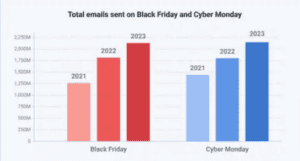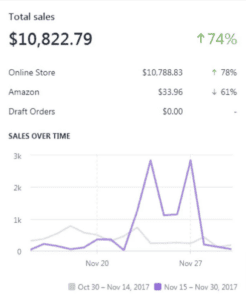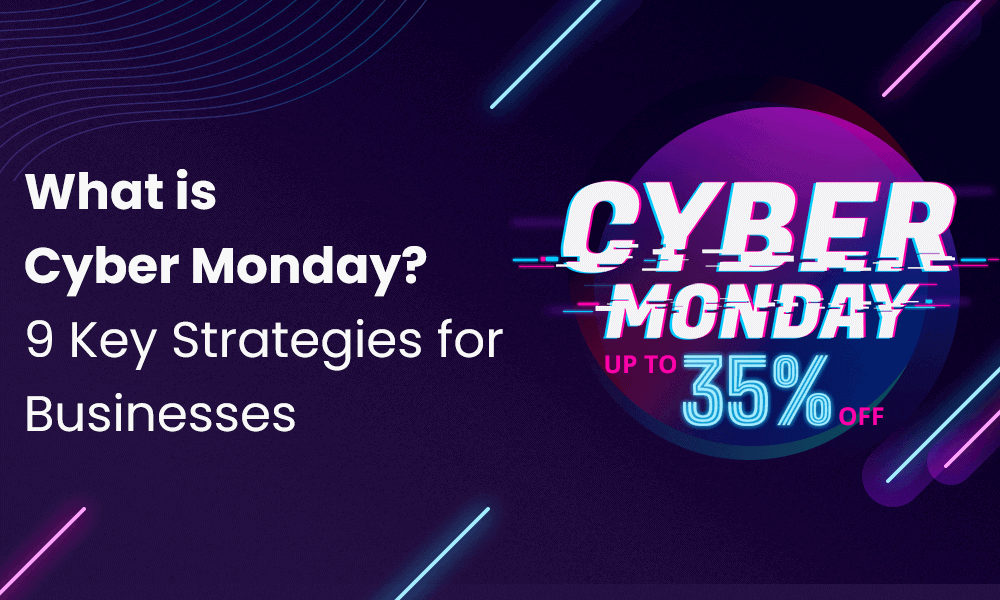It’s one of the most profitable shopping days on the calendar, followed by the day that still reigns supreme: Black Friday.
I’m talking about the one and only Cyber Monday, a holiday hot on the heels of Black Friday that could one day usurp it in terms of popularity and profitability, especially as we move toward a continually digital lifestyle.
Cyber Monday has become a sales touchstone for businesses across the world. That’s right, it’s not only celebrated in the United States. Although it’s a Thanksgiving-related holiday and other parts of the world don’t observe Turkey Day, Japan, the UK, and Canada have all gotten in on Cyber Monday, among other countries.
In this blog post, let’s explore what Cyber Monday is, and the strategies businesses can employ to make better profits.
Table of Contents
Key Takeaways
- Cyber Monday is one of the most anticipated shopping holidays of the year, meaning businesses of all sizes must be ready to promote their products and earn sales.
- Planning early is one of the biggest keys to success, as is understanding what your competition brings and what you can offer that’s different and better.
- Long-term promotional strategies such as building hype, offering valuable sales and discounts, and strengthening your customer service will serve your small business well, leading into the holiday season and beyond.
Understanding Cyber Monday
Before the 2000s, shopping on Thanksgiving weekend happened exclusively on Black Friday. It wasn’t until 2005 that Ellen Davis, the Consumer Brands Association executive vice president of industry engagement, created the term, although some say “Cyber Monday” as a concept existed even earlier.
Cyber Monday, celebrated on the Monday after Thanksgiving, came about by itself. Retailers studying consumer trends had noticed the same thing: despite being back at work, more people were spending the Monday after a long, four-day Thanksgiving break shopping than they were working.
This wasn’t only some people doing it; it was millions. At the time, this trend was studied exclusively in America, as they celebrated Thanksgiving that week and enjoyed a long four days off work.
And being back in the office was an important facet. In the early 2000s, household computers weren’t commonplace, and high-speed internet was far from the norm. However, businesses had to pay for high-speed internet at work to keep productivity up.
Americans had a much easier time shopping at work than at home in those days, so that’s what they did.
Cyber Monday did not take long to blast off on American soil, raking in $608 million by 2006. That number continually increased, hitting $887 million by 2009.
Read also: The Ultimate Sales Page Guide for Beginners (2024)
The Evolution of Cyber Monday
Of course, with Cyber Monday achieving such huge sales numbers, it didn’t take long for other parts of the world to introduce their shopping occasion. Here is when these countries caught on and began offering extended holiday sales:
- UK – 2009
- Sweden – 2010
- Portugal – 2009
- New Zealand – 2010
- The Netherlands – 2012
- Japan – 2012
- India – 2012
- Germany – 2010
- Colombia – 2012
- Chile – 2011
- Canada – 2008
- Belgium – 2016
- Australia – 2012
- France – 2008
As you can see, Cyber Monday only took a few years to become a global phenomenon. Be advised that despite the fact that these countries have adopted the concept of Cyber Monday, they don’t always refer to it by the same name or celebrate it at the same time.
For example, Australia debuted its version of Cyber Monday in 2012 called Click Frenzy. Also, Germany has a Cyber Monday week that begins the week before Thanksgiving and lasts eight days.
That’s also becoming more of a trend in other parts of the world. Going back to where it all began, the US, that country, has been pushing the boundaries of Cyber Monday for years.
Sometimes, the holiday is acknowledged before Thanksgiving even comes. However, that can be seen as stepping on the figurative toes of what is still perceived as the top day for online shopping, Black Friday.
That’s why extending Cyber Monday for the entire week after Thanksgiving is becoming increasingly common. This extra-long Cyber Monday even has a name, Cyber Week.
Cyber Week is more convenient for consumers who don’t always have the time, energy, desire, or money to shop right after Thanksgiving. Stretching the deals for another week gives them more opportunities to get their holiday shopping done.
Beyond benefitting audiences, Cyber Week also has plenty of perks for your business, such as a longer period of sales and more website traffic.
Impact.com presented some interesting Cyber Week trends. They surveyed over 1,000 brands across America and reported that clicks increased by 23% before Cyber Week as customers began preparing their wish lists.
Affiliate marketing is also especially advantageous around this time, with commission payouts 16% higher.
Read more: Affiliate Marketing — A Complete Guide for SaaS Businesses
9 Key Strategies for Businesses During Cyber Monday

With Cyber Monday the next big shopping day that could someday surpass Black Friday, every business and brand, big and small, wants a piece of the pie. I’m sure that includes your company, so how do you effectively promote yourself around the holidays?
Let’s take a look at some winning tactics.
1. Start early
Your Cyber Monday plan should be cemented long before October. You might be thinking, “Well, when does that leave me time to plan my Halloween marketing campaign?” The answer to that question is late in the summer.
You should always be at least a month ahead of whatever holiday is coming up so you have time to tease out your promotions and schedule your emails and social media posts in a timely manner.
Getting the hype train rolling out of the station earlier than your competitors will mean all eyes on your business, which should result in more Cyber Monday sales.
2. Use email marketing
Email marketing is your best friend for promoting your business any other time of the year, but it’s especially critical around Cyber Monday.
According to Mailgun, the amount of emails sent out on Cyber Monday versus Black Friday is quite similar, with Cyber Monday only trailing slightly behind. Yet the open rate for Cyber Monday is just that bit higher, they report, 14% versus 12%.

That tracks with other data that reports that open rates can swell up to 20% higher on Cyber Monday than any other day ending with Y. The click-through rates are up to 15% more.
Again, being early will behoove you here. You can send an automated email the week before Cyber Monday announcing and hyping your deals and what kinds of products you’ll have on sale. Then, follow up the night before Cyber Monday before dropping your deals the next day.
3. Get on social media
Hopefully, you’ve built a strong social media presence for your business before the holidays, as you’ll need it to rally your thousands of followers to shop.
You can start getting your readers excited for Cyber Monday as early as the first week of November. Of course, you should send semi-regular reminders of what’s coming up, especially as you draw nearer to the big day.
If you’re using social commerce, where your customers can shop online within social media platforms, then focus your promotions exclusively on social media. However, if you’re announcing your deals via email, use your social media campaign to drive more people to your website and email list.
Read also: Cyber Monday Email Templates that Guarantee Sales (2024)
4. Optimize your website
One of the simplest yet biggest mistakes you can make is failing to optimize your website in time for Cyber Monday. An unoptimized site takes longer than eight seconds to load, lacks clear navigation, doesn’t have calls to action above the fold, and is just a nightmare.
So, what do you think people do when they’re eager to shop and capitalize on deals when they find an unoptimized website? That’s right, they bail. And good luck getting that traffic back until you improve your site design.
Don’t just trust that a few improvements are enough. Test your site before publishing it.
5. Enhance customer service
Now is a great time to bolster your support staff and hire more people for the holidays. After all, with more activity on your website and more first-time online shoppers will come an influx of questions, concerns, and comments.
If your support staff is stretched too thin, they will struggle to provide ample assistance, hurting your business reputation among your new audience when you want them to see you positively.
6. Build seasonal landing pages
Another handy piece of advice is to revamp and update your landing pages. If you haven’t yet published unique landing pages for each of your products and services, now is a great time to sit down and write those (or ping your copywriter).
Make the landing pages seasonal, posting them for Thanksgiving weekend until right before the holidays. The copy can be holiday-centric in describing the benefits, which will help you close more deals.
7. Offer a great deal
Speaking of, one of the most surefire ways to drive more sales is by offering a killer deal your audience can’t find anywhere else. Maybe you have free shipping if the customer spends $25 when your competitors don’t traditionally do free shipping, or perhaps you slash prices lower than anyone else.
Whatever benefit you choose, run some numbers before you announce your deal to ensure you can afford the incentive.
8. Hype up your products
All aboard the hype train! It’s your responsibility to get people excited about your Cyber Monday sale. You have so many fun ways to do this, whether it’s a teaser video or photo, a countdown timer, or a gradual rollout of details.
9. Have a cart abandonment plan
Although you’re more likely to make a sale around Cyber Monday, cart abandonment still happens. People will change their minds for one of a million reasons, and you probably will never know which one inspired their decision.
Now is a great time to evaluate how you handle abandoned carts, whether through a tracking pixel reproducing your ads across the internet or a targeted email campaign.
Impact of Cyber Monday on Different Sectors
While the success of Cyber Monday has had a global impact, it’s affected specific industries differently. Let’s look at several industries, what kind of change Cyber Monday has caused, and how these businesses tailor their strategies.
Electronics
Cyber Monday continued its dominant reign into 2022, where it cracked $11.3 billion in sales. That same year, electronics had a field day, with sales up 391%, says Exploding Topics. Computer sales were up 372%.
Electronics were 2022’s biggest Cyber Monday shopping category. 2023 data from Fit Small Business reports that sales reduced electronics prices by up to 31%, which could explain why everyone has eagerly shopped.
Think about it from the consumer’s perspective. Electronics are usually quite expensive. Any chance to save, whether buying a gift for a loved one or even treating themselves, is usually appreciated.
Fashion
And who could imagine Cyber Monday without apparel sales galore? Fit Small Business says the rate of clothing sales between October and November jumped by 189%.
Black Friday is typically the day known for shopping for bigger items, with Cyber Monday becoming a sales occasion for apparel and smaller tech, so that’s probably why sales for fashion jumped so appropriately.
Toys
In 2022, toys were the biggest-selling Cyber Monday category, with sales in November 684% higher than in October. That barely changed in 2023, notes Fit Small Business. Specifically, video game consoles and toys were the biggest sellers, along with televisions, small kitchen appliances, and skincare sets.
The rate of toy sales between October and November 2023 shot up by 140%, likely since the average discount for toys was almost 30%.
Jewelry
Jewelry is a perfect gift to discover under one’s holiday tree, so it makes sense that Fit Small Business noted a 99% increase in daily sales averages between October and November 2023 for necklaces, rings, bracelets, earrings, and other jewelry.
Travel and software
I know these seem like strange bedfellows, and on their own, they are. However, many businesses have begun bundling their Cyber Monday offers to make them more appealing and profitable.
For example, they might include a software bundle rather than offering only a traditional product. If not software, it will be a travel bundle to maximize the overall value.
Read more: 103 Cyber Monday Email Subject Lines for High-Impact Campaigns
Cyber Monday vs Black Friday
You can’t talk about Cyber Monday without uttering Black Friday in the same breath. The two are synonymous with each other and may always be, but that doesn’t make them the same.
There are enough differences between them that your business should use both holidays to harness more sales over the long holiday weekend.
Let’s take a look at where Black Friday and Cyber Monday diverge.
Days celebrated
Okay, let’s get the most obvious difference out of the way first. Black Friday is always celebrated the day after Thanksgiving, whereas Cyber Monday is the Monday after Thanksgiving.
Can the two days sometimes bleed into one another during a long sales weekend? Yes, but most companies will still distinguish between Black Friday, Small Business Saturday, and Cyber Monday.
In-person vs online shopping
Black Friday has been around since the 1950s, predating the internet. Back then, in-store shopping was your only option. As technology evolved, Cyber Monday became the counterpoint to Black Friday, serving as the primary online shopping day versus in-store shopping for Black Friday.
While Black Friday deals will still be available in stores in 2024, many sales will migrate online. It’s safer (how many Black Friday kerfuffles have you seen online? I know I’ve seen my fair share!) for consumers and easier for companies.
Types of items sold
As Black Friday and Cyber Monday emerged as two separate occasions, the types of goods sold for each day similarly diverged. Since Black Friday was primarily about shopping in stores, many big-ticket items went on sale that day. Smaller tech items were usually saved for Cyber Monday.
Nowadays, the lines have blurred. Companies will sell all items on Black Friday and Cyber Monday, whatever will make them the most money.
How to maximize earnings on Black Friday and Cyber Monday
One of the biggest areas where businesses will struggle with four or five days of sales is keeping the momentum going. If you make all your big announcements on Black Friday, how do you keep up the interest in Cyber Monday?
Well, you shouldn’t make all your announcements too early. Save something for the Monday crowd, launching a whole new crop of deals and deep discounts for those who waited a little later to shop.
Read also: 10 Examples of Black Friday & Cyber Monday Email Campaigns
Innovative Cyber Monday Campaigns
Before wrapping up, I have a collection of case studies from businesses that successfully utilized Cyber Monday marketing measures to take their companies to the next level.
EngageBay
Yes, okay, we’re starting with our brand, but hey, we know a thing or two about Cyber Monday marketing!
The EngageBay site gets decked out for the holidays between Black Friday and Christmas. Beyond the Christmas emblems like Santa Claus and candy canes are specialized holiday landing pages.
All holiday deals are combined under one header—so there’s no need to update the landing pages and website until after Christmas. Besides that, EngageBay discounted its services by 40% for this campaign, a hugely steep discount audiences paid attention to.
Huskybeard

Paul Lee of Huskybeard, a beard care brand, had a new store and was gearing up for his first-ever Thanksgiving holiday weekend in 2018, which meant deals on Black Friday and Cyber Monday.
The Huskybeard brand was only six months old but doing well with sales, so these two holidays should have been a cinch, right? Yet Paul was concerned that beard companies larger than his would steal the spotlight.
He decided to plan 45 days before Thanksgiving weekend to ensure his brand could capitalize. First, he did in-depth competitor research, especially the companies that had succeeded in sales between Black Friday and Cyber Monday.
Once he had that information, he could determine what was unique about Huskybeard and position his brand so that he had a banner first on Black Friday and Cyber Monday.
Here is a peak of his sales:

Conclusion
It’s hard to believe that Cyber Monday isn’t even 20 years old yet and has already greatly impacted how we do our holiday shopping. It will only become a more important holiday as we usher deeper into the digital age.
Businesses must be ready to innovate and adapt to maximize returns from this global shopping event. Finding what makes your business unique and harnessing it will inspire your audience to choose you over your competitors.
Oh, and above all else, start early! The more time you have, the better your campaign will be, producing more of the desired results.
Frequently Asked Questions (FAQ)
1. What is the best way for a small business to stand out on Cyber Monday?
Tasting success as a small business on Cyber Monday requires the right strategies, such as:
- Building a holiday-centric, ultra-targeted landing page
- Optimizing your website for mobile traffic
- Offering an excellent deal the competitors aren’t, such as a steep discount or free shipping
- Using email and social media marketing to your advantage
- Working with influencers or affiliates
- Using urgent language to inspire people to buy now
- Teasing out your Cyber Monday products early
- Understanding your audience and advertising to their needs and pain points
2. How can small businesses compete with larger retailers on Cyber Monday?
Small businesses must understand their audiences around this time of year and then make personalized recommendations for everyone on their wish lists.
Also, take the time to strengthen your reputation by publishing high-authority content and producing excellent goods that garner good reviews. Oh, and improve your customer service, and don’t be afraid to try out promising marketing and eCommerce trends.
3. What are some unexpected challenges businesses face during Cyber Monday?
Lots of snags can occur on Cyber Monday, such as stockouts, struggling to ship last-minute purchases on time to arrive for the holidays, or overestimating inventory and having too much and no interested buyers.
4. How early should businesses start preparing for Cyber Monday?
As early as possible – summertime is not too early to begin! You’ll have time to research audience trends to determine which products to promote, and you can do competitor research. You can also plan your campaign, improve your website, and ensure sufficient inventory.

